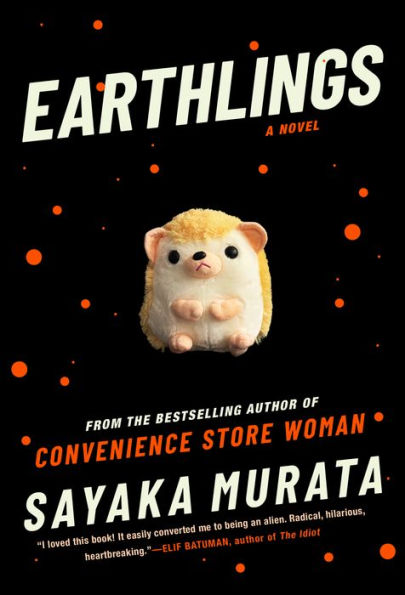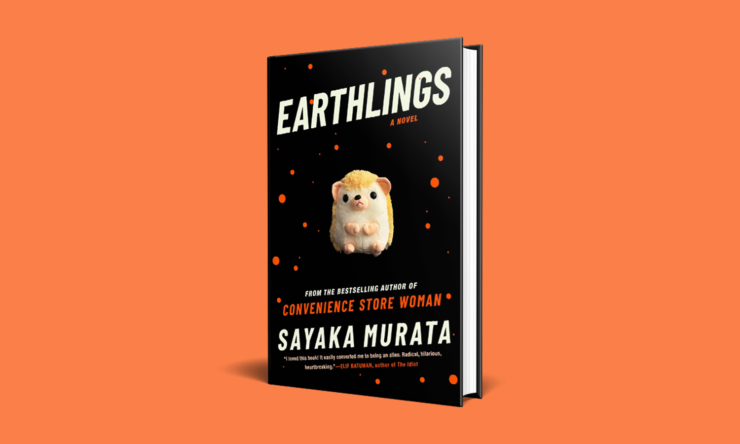Sayaka Murata’s new novel is a methodical descent into a very special, almost rational kind of madness. Like much of her previous work, Earthlings starts off as a bleak examination of conformity, reproduction, and sexuality in Japanese culture. Pain and otherness are the wretched heart of Murata’s oeuvre, laced with the weary practicality that comes with enduring such a hostile reality. It is, after all, exhausting to be yourself, especially in a society that judges and punishes any and all transgressions.
But Earthlings is about far more than the endless trauma of fitting in. It’s a story about the mental gymnastics that lead us to strange and unearthly places in order to survive. Translated by Ginny Tapley Takemori, this is the second of Murata’s books to be brought to an English-speaking audience. In 2018, her acclaimed novel Convenience Store Woman became available in English, taking new readers on an uncomfortable journey through the eyes of asexual Keiko, forced to play along by conventional expectations of success and marriage.
If you were delighted by the Convenience Store Woman’s charmingly bleak look at the comforting practicalities of konbini corporate culture, the good news is that Earthlings is a variation upon that same premise, but with drastically different consequences. It’s a methodical descent into psychosis, desperation, and isolation, culminating in an intense coda of Cronenbergian body horror. Murata annihilates so many social taboos to get to this point, taking each to a wildly discomforting extreme, and still manages to plumb new depths of shock in the book’s final pages. Earthlings, while still very much a pointed social critique, is aggressively more of an outright warning than its predecessor.
[Content warning: mentions of fictional abuse and violence]
Buy the Book


Earthlings
We first meet Earthlings’ protagonist, Natsuki, as a precocious young girl convinced that her stuffed toy, Piyyut, is an alien from Planet Popinpobopia. The next closest friend she has is her cousin Yuu. Yuu is also her boyfriend. These neat, tidy facts are constants that frame Natsuki’s inner world, even as she begins to lose control of her secrets.
Earthlings starts and ends in the rural mountains of Akishina—reflecting both a return to nature and the closest place that nine-year-old Natsuki can physically get to outer space. “I felt like I was gradually moving toward the sky,” she muses as her father drives up the steep mountain road. “Granny’s house is high up, close to the universe.” Natsuki is the embodiment of pure excitement, ready for her family’s annual celebration of the Obon Festival. Through Takemori’s brisk translation, Murata swiftly establishes an all-too-familiar portrait of a city child itching to escape the confines of city life—perhaps a little heavy-handed as a metaphor for “civilized” behavior—for a taste of something wilder.
Where the first chapter is more or less an endearing but claustrophobic portrait of family life in a traditional Japanese setting, as Natsuki grows up, so does her sense of alienation. “My town is a factory for the production of human babies,” she flatly announces in the next chapter, comparing her town to a nest of insects. It’s a stark tonal shift that reflects both her cynicism and the desire to escape to Popinpobopia, which she now considers her true home. It’s a small, otherworldly seed that blooms into a greater psychological narrative that she wields as a coping mechanism for the rest of her life.
There’s a perverse sort of musicality to the way Murata plants her own seeds through Natsuki’s adolescence, building up her protagonist’s dogged, strong-willed personality and deadpan observations of the world around her. The result is a scathing indictment of Japanese cultural priorities—parenthood, socioeconomic stability, and conformity are constant themes as we follow Natsuki through the tedium of cram school, puberty, and cartoonishly evil depictions of her family.
But mired in Natsuki’s internalized sense of uselessness and worthlessness, the first portion of Earthlings comes off as an emotionally draining experience. Murata is ruthless in highlighting Natsuki’s burgeoning sense of otherness. “Where on earth does that child get it from?” Natsuki’s mother complains. “She doesn’t take after us, that’s for sure.” And, as if softening the reader for the real meat of the book, Murata kneads in relentless trauma—physical and emotional abuse, pedophilia, sexual assault, rape, autocannibalism, regular cannibalism, neglect, and stigmatization. Natsuki shrugs off being her mother’s punching bag as she endures far worse from the people around her. In short, it’s a lot to get through, but Murata hammers home her message: what most people consider ordinary often isn’t remotely acceptable or normal.
There’s a lot to be said about the novel’s treatment of incest, too. Back in Akishina for their grandfather’s funeral, Natsuki asks Yuu to have sex with her, hoping it will fully consummate their childhood marriage. It’s a tender, awkward scene between two sensitive, vulnerable children who want to be as close as possible. Natsuki, reeling from her recent rape, asks, “Have you ever had the feeling that you want to get inside someone else’s skin?” Taboo aside, it’s an earnest moment by two kids who clearly need better support in their lives. And naturally, when the adults discover what they’ve done, they’re torn apart and vilified. Later on, another character, driven slightly mad by anxiety and spite, actively seeks out incest as a means of liberation. Murata pulls no punches when it comes to exploring two sides of a contentious coin; Natsuki’s small, pure moment with Yuu is probably the closest thing she’s had to real intimacy.
By the time we meet Natsuki as an adult, she’s settled into a mechanical rhythm: a strategic marriage “arrangement” with a fellow asexual to stave off nosy family and friends. A careful, formal system of etiquette with said family and friends. Looking back at the beginning of Earthlings reflects a purer, easier time—not just for Natsuki, but for the reader. Her thoughts of Popinpobopia endure, and her term for conventional breeding society—“the Factory”—has spread to her husband, Tomoya. Her shared life with Tomoya—functionally more of a roommate—finally comes to a head when Tomoya gets fired from his seventh job. While Natsuki may be somewhat stable, she’s far from being fulfilled or happy. She simply is, and for someone with her trauma, that’s all we can expect.
Perhaps Murata’s Convenience Store Woman, with similar themes of conformity and faking it, was testing the waters to explore something far more extreme. Earthlings, in all its offbeat glory, is the natural conclusion to what happens when you push people to the fringes of society without compassion or empathy. As Natsuki and Tomoya meet Yuu back at the remote Akishina mountain house, their little collective—three broken outcasts pulling in varying directions—becomes the closest thing to a family she’s ever had. Once again, Popinpobopia becomes the center of Natsuki’s universe, but with a greater sense of urgency and desperation as she’s now an adult with the full knowledge that things don’t get any better.
While Earthlings isn’t a clear-cut example of a specific genre, it blends the classic trope of escapist science fiction with horror to document Natsuki’s disassociation with a grotesque, cruel world. Popinpobopia—an alien culture—becomes a quintessential example of how we craft our own fictions to frame an imperfect reality. With this quasi-anthropological approach to dissecting conformity and dominant social paradigms, Murata builds a fragile bubble in which Natsuki struggles to preserve her pseudo-xenozoological qualities. It’s a lifetime of trauma packed into an unforgiving story about self-identified aliens seeking a home among a hostile populace. Murata’s candid, matter-of-fact tone only serves to highlight the gulf between accepted “normalcy” and Natsuki’s brand of unearthly otherness.
Earthlings is an exhausting read, but one that forces the reader to confront their own biases and standards for what is socially acceptable, and more importantly, what they deem acceptable in others. Horror is often a mirror for things we’d rather not see, and sci-fi often a vehicle to places we’d rather be. Murata marries elements of both into one meticulous journey to the heart of human psychology—one that forces us to address our own reflection—if you have the endurance to get to the end.
Earthlings is available from Grove Press.
Alexis Ong is a freelance culture journalist with weak ankles who mainly writes about games, tech, and pop culture. Her work has appeared in The Verge, Polygon, Kotaku, Rock Paper Shotgun, VICE, Dazed Digital, and more; soft spots include science fiction, internet archaeology, comics, boxing, and old games. You can find her at her website or on Twitter.










